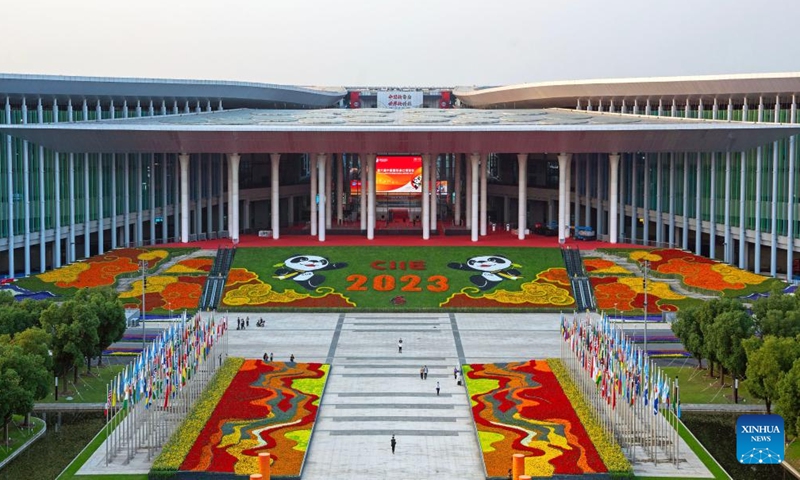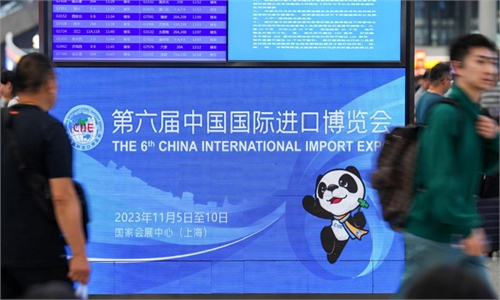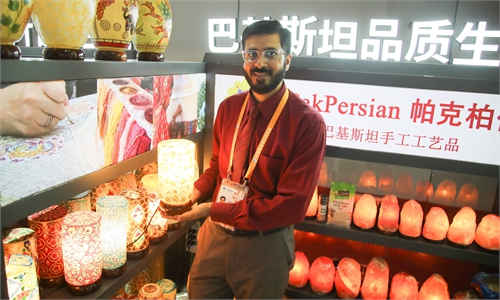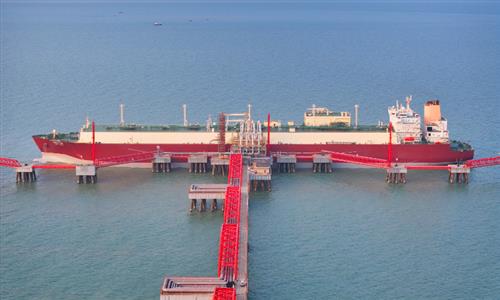Whose interests are harmed by voices that speak ill of China? : Global Times editorial

This photo taken on November 3, 2023 shows the south square of the National Exhibition and Convention Center (Shanghai), the main venue for the 6th China International Import Expo (CIIE), in East China's Shanghai. Photo: Xinhua
The 6th China International Import Expo (CIIE), currently taking place in Shanghai, is thriving. The most immediate impression at the scene is the confidence in the Chinese economy and enthusiasm of companies from around the world. However, it seems that there are some who have chosen to doubt this success. In recent days, some foreign media outlets have suddenly started to cast doubt on China's prospects for attracting foreign investment. There are even some bizarre viewpoints suggesting that foreign investment has never been as "afraid" of China as it is today. For more than 3,400 exhibitors participating in the CIIE, it is certain that this is the biggest joke they have heard recently.
These negative sentiments toward the Chinese economy are no news. The foreign media reports bring out two new details this time: first, China's direct investment liabilities experienced a net outflow from July to September this year, and second, according to their own research, foreign companies have been withdrawing profits from China for six consecutive quarters. Economists believe that if the above phenomena are true it is mainly due to the interest rate differences between China and Western markets, causing some capital to flow out in pursuit of higher returns. This is only a short-term phenomenon and cannot support the conclusion made by foreign media that China's attractiveness to foreign investment is declining.
In fact, there's no need to meticulously scrutinize every bit of evidence reflecting the state of the Chinese economy. Just visit the CIIE in person, take a look around - the scenes there are genuine and unadulterated. It provides the most vivid and direct reflection of foreign investment's attitude toward the Chinese economy.
If supporting data is a must, there are many authoritative, comprehensive, and objective sources that contradict the idea of "foreign capital withdrawing from China." For example, according to data from China's Ministry of Commerce, from January to September of this year, the number of new foreign-funded enterprises in China increased by 32.4 percent year-on-year. The actual use of foreign investment in manufacturing increased by 2.4 percent year-on-year, and the use of foreign investment in high-tech manufacturing saw a 12.8 percent year-on-year increase. These growth figures were achieved against the backdrop of a global contraction in investment and trade, and they corroborate the fervor at the CIIE. It's because of the unfavorable global economic environment that global companies have a greater demand to come to China to seek and expand opportunities.
Of course, this does not mean that China's investment environment is flawless. In fact, China has never ceased its efforts to optimize the investment environment, and these efforts have grown stronger in recent years. The measures for high-level opening up to the outside world are tangible. Since 2013, China has reduced the negative list for foreign investment access seven times, comprehensively removed restrictions on foreign investment access in the manufacturing sector, and further expanded openness in the service industry. Additionally, China has established 22 pilot free trade zones covering various regions, creating better conditions for various types of enterprises to thrive in China to the greatest extent possible.
It is this clear attitude and practical measures that have made China one of the most attractive markets in the world. The World Investment Report 2023 released by the United Nations Conference on Trade and Development (UNCTAD) in July this year shows that due to factors such as the Ukraine crisis and rising food and energy prices, global foreign direct investment (FDI) decreased by 12 percent in 2022, and FDI in major developed economies decreased by 37 percent. However, China saw a 5 percent increase in FDI, ranking first in Asia. Moreover, the majority of investments came from European multinational companies, with a focus on the manufacturing and high-tech sectors. This clearly illustrates that as long as China remains committed to development, regardless of external circumstances, its attractiveness as an investment destination will continue to grow.
Objectively speaking, there are indeed some companies that have hesitated to invest in China outside the wave of cooperation. This hesitation is primarily due to the rapid deterioration of the political atmosphere in the US toward China, and the US' efforts to promote "decoupling," which has made these multinational companies worry about potential repercussions. In this context, security considerations, rather than normal economic logic, have become their primary concern. However, actions that go against economic principles are unlikely to be sustainable or become mainstream. It's worth noting that there have been signs of a thaw in China-US relations recently. At this particular juncture, the sudden wave of negative commentary about the Chinese economy raises questions about whether there might be some political motives behind it.
For decades, the negative commentary about the Chinese economy hasn't ceased, but it's a fact that these narratives haven't deterred China's progress. If these voices have had any impact, it's likely that they have only misled some investors from their own countries, causing them to miss out on the new opportunities of the 21st century. The future will see China's door of openness only widen further, integrating into the global wave of cooperation. This kind of harmonious collaboration is the true theme of the times. The background noise of those who speak negatively about China, much like the buzzing of mosquitoes, is simply annoying and ultimately inconsequential.




